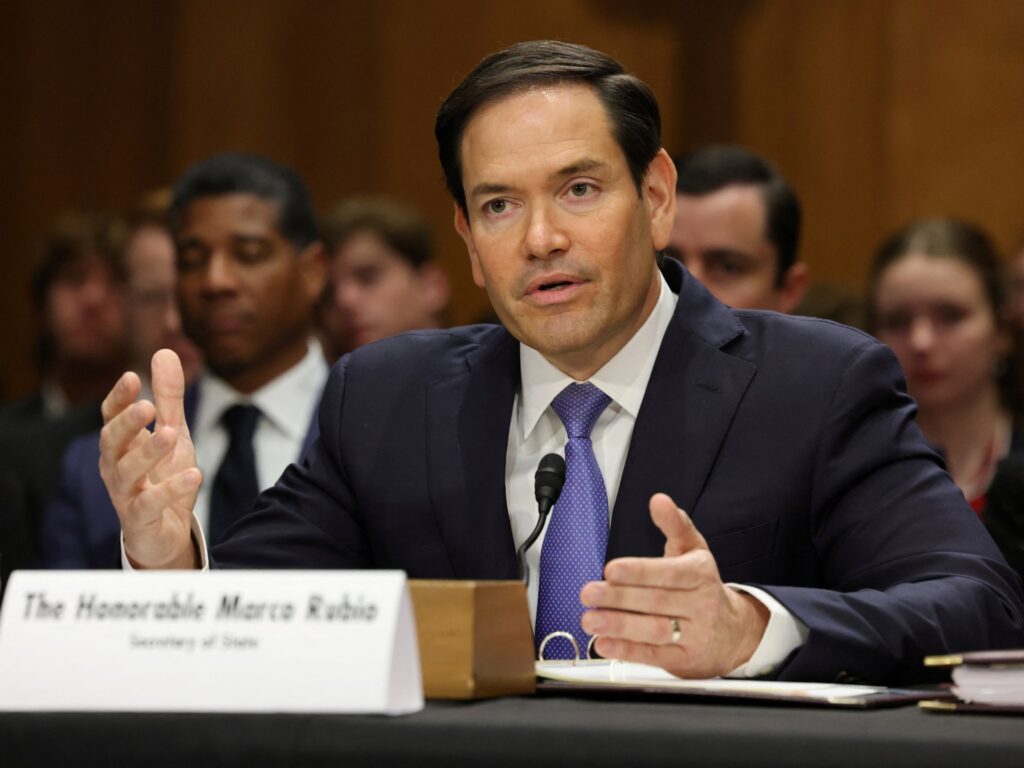Washington, DC – Top United States diplomat Marco Rubio has suggested his country’s “engagement” is what led Israel to allow a limited amount of aid into Gaza after a months-long blockade on food, medicine and other basic supplies.
At a Senate committee hearing on Tuesday, Democrat Jeff Merkley pressed Rubio, a Republican, about his stance on Israel’s blockade, which spurred fears of imminent famine in the Palestinian territory.
The secretary of state replied that the US is happy to see humanitarian assistance start to enter the territory.
“Ultimately, I don’t think you would have seen the events of the last couple days without our engagement and the engagement of others,” Rubio said.
Israel allowed several aid trucks to enter Gaza on Monday, and United Nations officials have said that around 100 more were cleared to reach the territory on Tuesday.
But that quantity still represents a fraction of the daily needs of Gaza’s population, which numbers over 2.1 million people.
“Israel remains a strong ally. We’re supportive,” Rubio continued. “We understand why for their security Hamas cannot exist. We are also very happy to see that they have allowed aid to begin to flow, and we hope that that will continue.”
Several Western countries, including close partners of Israel, have recently decried the Israeli siege on Gaza. On Monday, the leaders of the United Kingdom, France and Canada said in a joint statement that they were “horrified” by Israel’s military escalations in Gaza and its blockade on humanitarian aid.
They threatened to pursue “concrete actions” like sanctions if Israel continued to expand its military assault.
The administration of US President Donald Trump, meanwhile, has remained staunchly pro-Israel, but experts say recent moves from the White House signal a growing gap between the US and Israel.
For example, Trump did not include Israel as a stop in his recent trip to the Middle East. He has also initiated diplomatic talks with Iran and declared a ceasefire with Yemen’s Houthi group — both of which are adversaries of Israel in the region.
The Houthis, for instance, continue to launch missiles and drones at Israel in a show of support for the Palestinians in Gaza.
Still, over the past three months, the US has refused to directly criticise Israel’s decision to prevent food and medicine from reaching Gaza.
But last week, at a stop in the United Arab Emirates, Trump indicated he wanted to get the situation in Gaza “taken care of”.
“A lot of people are starving. There’s a lot of bad things going on,” he said.
Also last week, in an interview with the BBC, Rubio said he was “troubled” by the humanitarian crisis in Gaza.
UN humanitarian chief Tom Fletcher also told the BBC on Tuesday that as many as 14,000 children in Gaza are at risk of dying in the next 48 hours if food does not reach them.
Last year, the International Criminal Court (ICC) issued arrest warrants for Israeli Prime Minister Benjamin Netanyahu and his former Defence Minister Yoav Gallant over possible war crimes in Gaza, including the use of starvation as a method of war.
On Sunday, Netanyahu said Israel would only allow a “basic quantity of food” into the Palestinian territory to stave off international pressure.
“Our best friends in the world – senators I know as strong supporters of Israel – have warned that they cannot support us if images of mass starvation emerge,” he said, according to the publication Haaretz.
The Gaza Government Media Office said on Tuesday that at least 58 Palestinians have died of malnutrition over the past 80 days.
At Tuesday’s Senate hearing, Rubio appeared to acknowledge that more aid needs to reach the Palestinians in Gaza.
“I understand your point that it’s not in sufficient amounts,” Rubio told Merkley. “But we were pleased to see that decision was made.”
